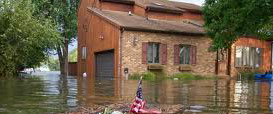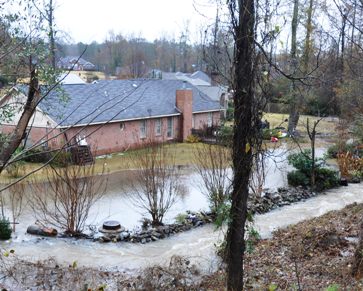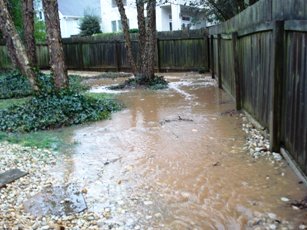For service in the Atlanta, Georgia area contact or call us:
Common Drainage Problems in Atlanta
Our Drainage Specialist help our clients in Marietta, Sandy Springs, Dunwoody, Roswell, Alpharetta, Cumming, Norcross, Brookhaven, Decatur, Atlanta, Lawrenceville, and Fulton County.
Call for assistance with your drainage problem.
Water damage experts have the expertise to find the cause of common drainage problems. Small problems have a way of becoming big problems when ignored. This is especially true of drainage problems. Standing water can lead to mold and mildew as well as structural problems to your home.

What can you do to prevent flooding and water damage to your home? How is the best way to determine the source of your water problem?
Seek the help of professionals. An experienced engineer or hydrologist can help you determine the source of your problem and he can advise you of ways to prevent water from entering your home.
We advised one of our clients to install a shallow ditch (sometimes called a swale). The ditch intercepted the water and carried away from him home. It was an economical solution to his problem.
It is cheaper to direct water away from your home than to remove water after it gets into your basement or crawl space.
Common Drainage Problems in Residential Communities:
- Houses Built at the Bottom of a Hill
- Seepage from the side of a hills
- Surface Water Drainage onto a neighbor
- Storm Flooding in heavy rains
- Yard Erosion
- Soggy, Wet Yards
- Crawl Space Water Damage
- Basement Water Damage
Houses Built at the Bottom of a Hill
Beware of houses built at the bottom of a hill! These locations are prime sources of common drainage problems.
Our experience in analyzing common drainage problems has alerted us to this issue. Water drains downhill. Being downhill of your neighbors does not have to be a problem but so often it is.
When purchasing a home which sits at a lower elevation than the surrounding homes, have a qualified water damage expert inspect the storm water drainage. We look for potential problems that may exist which can later cause you water problems and damage to your property.
When buying a home, it is so easy to get involved in the layout of the kitchen and how the master bedroom functions, that the exterior of the house and yard are given little consideration. Improper grading of yards rank near the top of the list of common drainage problems. Look at it. If you suspect a problem, call a hydrologist to advise you.

Ninety-eight percent of our calls about common drainage problems are from homeowners whose house sits at the bottom of a hill.
First, water flows downhill. The water from the property at a higher elevation flows to the property sitting at a lower elevation.
When we point this out to homeowners, they often think their situation is hopeless. Well, it is not. The storm water needs to be collected and routed away from the property to a suitable outlet.
Our water damage experts have had years of experience solving storm water drainage problems. Each situation is different. No two sites are the same. We look for the most economical solutions that will solve the problem.
Poor Grading Creates
Common Drainage Problems
Often, yards are poorly graded and direct water toward the home. Good drainage requires that the yard be graded to direct water away from the foundation of the home. This type of grading is known as positive drainage. The ground should slope away from the foundation of the house in all directions. Proper grading solves most common drainage problems.
By keeping water away from the house and it's foundation, water cannot get into the house or basement.

Unfortunately, many builders do not follow the recommendations of the local building codes. Building codes require a minimum drop of 6 inches in the first 10 feet from the foundation of the house. Our water damage experts have inspected hundreds of homes and few have the required slope away from the house foundation.
The proper slope is vitally important. The grading contractor removes the dirt to construct the foundation. The concrete foundation contractor pours the foundation. The grading contractor backfills the foundation excavation with soil. Rarely does a contractor properly compact the soil used for the backfill.
Over time the loose soil settles and creates a sunken area adjacent to the foundation. The low area holds water and the water seeps into the ground and enters the basement through cracks in the foundation wall, a most common drainage problem.
The shrubbery around homes makes it difficult to detect the settlement around the foundation. Also, plants and mulch placed around shrubs can prevent water from draining away from the foundation.
Water allowed to pool adjacent to your foundation will seep into the soil around your foundation. The saturated soil can reduce the structural integrity of the soil under the foundation.
If one or more areas under your foundation become saturated, differential settlement can occur. The uneven settling of your foundation will cause cracks in brick, doors that will not close properly and windows that are difficult to open and close.
Storm Flooding
We received a frantic call from a homeowner asking, "A storm came through our neighborhood last night and our yard and basement are flooded, what should I do?"
This is a common drainage problem. It is a common problem because your drainage system gets tested by the rain. Sometimes, a system that has worked fine for years suddenly doesn't function properly.
An example of storm flooding...
An attorney we have worked with for years on many drainage cases called after his house was flooded. He explained that his family had lived in their home for more than 10 years. This was the first time their basement had ever flooded.
Our investigation determined that the outlet pipes for his foundation drains were clogged. Water was unable to be removed from the foundation for his basement. The water found a new outlet which was his basement. Small animals had carried debris into the end of the foundation drainage pipe and water could not get out of the pipe.
The pipes were unclogged and his problem was solved.
Sometimes building contractors install pipes which are too small to handle the water; another common drainage problem. This is usually discovered after a heavy rain event and your basement is flooded. Water damage experts check pipes for proper size.
Yard Erosion
Often homeowners call us about erosion problems on their property. Many times the source of the erosion problem is surface drainage from a neighbor's property. When the neighbor's property is higher, you can count on the water flowing downhill to your property....another common drainage problem. Our water damage experts assess these types of issues.
Another potential source of erosion problems are downspouts that cause concentrated flow across the yard. Downspouts should be piped to a safe outlet. When changing piping, make sure the discharge will not cause drainage problems for your downstream neighbor.
A yard with an abundance of shade will not properly grow grass. Over time a well sodded yard will begin to thin. As the grass thins, storm drainage water carries the topsoil with it. Over time, the topsoil is washed thin and the yard will not support growth of grass.
Special care should be given to hilly lots which are graded flat for the house site. Steep slopes cause water to race across them which cause erosion. Water damage experts with drainage experience are usually needed to solve steep-sloped embankment problems.
Our water damage experts are certified in the use of the Georgia Erosion and Sedimentation Control regulations.
Soggy-Wet Yards
A soggy-wet yard is a disaster for everyone but especially if your family has small children. Children want to play outside and will gravitate to the water and mud. Then they come into the house and track the mud into the house.
We are asked, "Why does my yard hold water?"
A factor in Georgia is what we call "Georgia Red Clay." It is a heavy clay material which does not let water pass readily through it. So water does not absorb into the soil.
Often the topsoil is removed when preparing the site for the house. That leaves the "Georgia Red Clay" for the yard. Georgia red clay does not grow grass very well and the water puddles in poorly graded lots. If the yard is not graded properly, the water will sit for days until it evaporates.
Several solutions are possible for these types of situations.
First, the water damage expert checks the slope of the yard. Yards need a minimum slope of 3 percent to properly drain. Properly sloped yards should be established before re-sodding the yard.
Another potential problem that should be assessed is seepage from cut embankments. If the lot was cut into a hill, the exposed soil at the face of the cut can discharge water.
Subsurface water roughly follows the contour of the surface of the ground. A vertical cut exposes the travel path of subsurface water. Now any water discharged from the bank of the hill will flow down the hill to the yard. The water will get the yard wet for days after a rain.
A French drain is potential solution. Water damage experts can determine if a French drain is the right solution. A French drain involves excavating a ditch, installing a perforated pipe encased in gravel. The pipe is "day lighted" at a location away from the house.
Other solutions are plants and vegetation that tolerate wet areas. As a general rule, vegetation will not totally solve a wet yard problem. It can be utilized in certain situations to solve common drainage problems.
Our recommendation is to seek the advice of a water damage expert.
Crawl Space Water Damage
Water that pools in a crawl space and around the foundation creates many problems. If standing water exists for a period of time, mold and mildew will begin to grow and floor joists will start to rot. This is a very serious but a common drainage problem.
What should you do?
Before calling a construction company, determine the cause of the standing water. Until the pooling of water is solved, mold remediation, replacing of decayed floors and molded insulation is a waste of money. Find the source of the water.
Water damage experts concentrate on the source of the problem.
Common water problems come in shapes and sizes. Check your gutters and downspouts. Check for settlement of the foundation of the house, improper landscaping, steep slope embankments and other common drainage problems which may cause water to enter the crawl space.
Beware of the contractor that only wants to sell you his construction services. Our water damage experts do not provide construction work. Our service is to help you identify the source of the problem and recommend a solution. You select a qualified contractor to perform the construction work.
Basement Water Damage
Water in basements is a common problem. Where does the water come from?
The problem may be a small leak in the walls of the basement or a completely flooded basement. Either way, the source of the water needs to be determined. Only after the cause of the water problem is solved should you consider repairing the damage to the house.
It is better to address the problem as soon as it is discovered and before it becomes a much larger problem. As times passes mold and mildew begins to grow. This affects your quality of life in your home.
Locate the source of the water problem. If it is not obvious, contact a water damage expert to assist.
The problems may be as simple as having a plumber repair a leaking water line or a leaking laundry room connection.
If surface water is causing the problem, you may need the expertise of a water damage expert. Additional steps may be required to prevent leaking in the future.
Call your insurance company to determine if your policy will cover this type of damage.
Begin removing the water from the basement as soon as possible. If you don't have a wet vacuum or wet shop vacuum, go to the store and purchase one or borrow one from someone that you know. Additionally, places are available where you can rent these. Rental facilities also have fans and dehumidifiers available to rent.
Water damage experts analyze drainage problems and can help you with your water issues. Such as:
- Houses Built at the Bottom of a Hill
- Storm Water Yard Drainage Problems
- Surface Water Drainage
- Storm Flooding
- Yard Erosion
- Soggy, Wet Yards
- Crawl Space Water Damage
- Basement Water Damage
Area Served by Atlanta Engineering Services
for Common Drainage Problems
Cobb County, Fulton County, Gwinnett County, Forsyth County, Henry County and Clayton County.
Johns Creek, Milton, Alpharetta, Roswell, Sandy Springs, Marietta, Smyrna, Brookhaven, Atlanta, East Point, Stockbridge, Lawrenceville, Suwanee, Cumming, Powder Springs, Dacula, Peachtree Corners, Norcross, Doraville, Chamblee, South Fulton, Duluth, Stone Mountain, Canton, Gainesville, Dawsonville, and Acworth.
Additional Stormwater Drainage Information:
Find a Drainage Specialist for consultation
Yard Drainage Problems Devalues Property
Simple Solutions to Residential Drainage Problems
Learn the Benefits of Stormwater Drainage Swales
Solving Wet, Soggy Yard Problems
Common Drainage Problems of Homeowners
Preventing Crawl Space Drainage Issues
Do I have a Groundwater Spring on my Property?
Stormwater Damage from the Property Above
Stormwater Utilities and Detention Ponds
Forensic Hydrologist Evaluates Stormwater Runoff
Hydrology Expert Contact Information
Additional Services by Atlanta Engineering Services
Qualifications
Our clients receive the highest level of service from our team of Civil Engineers , Forensic Engineers, Professional Land Surveyors , Professional Hydrologists, and ACTAR Certified Re-constructionist. Learn more here.
Brochure
Download our company brochure, by clicking here , to learn more about AES and the stormwater drainage, engineering and land surveying services we offer.
G-ZNJ8QW23K9
